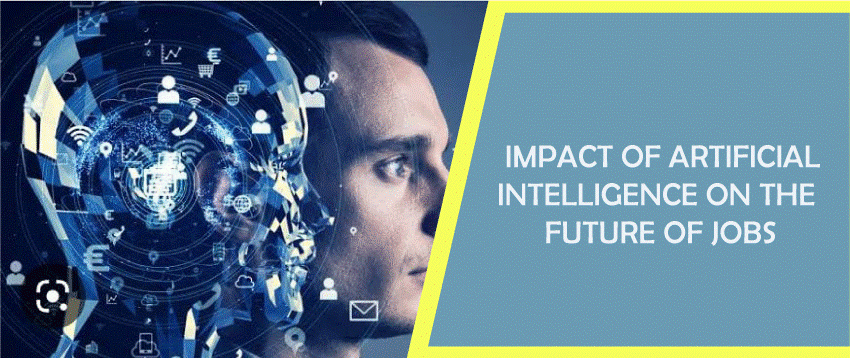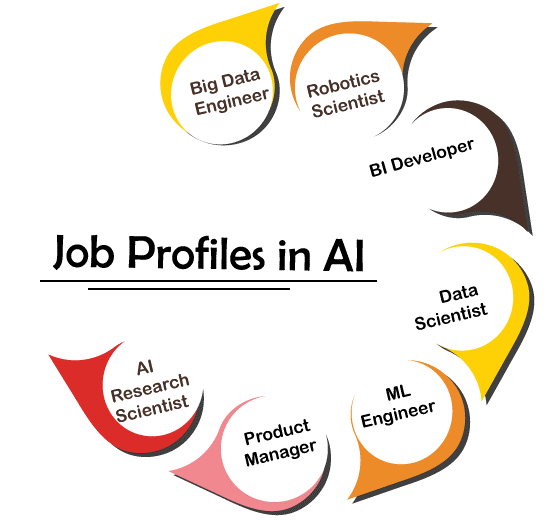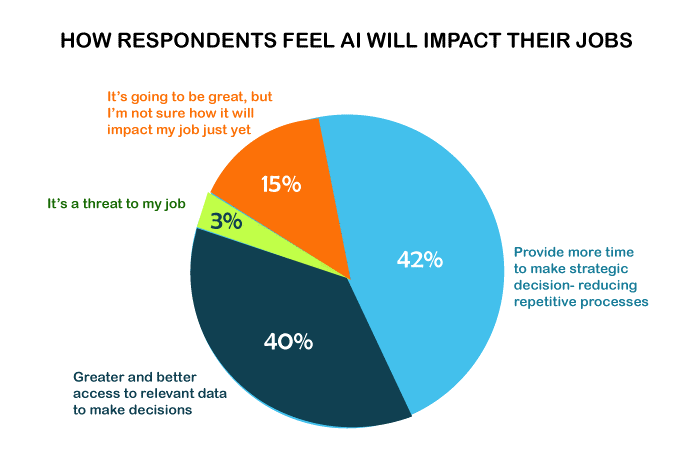Impact of Artificial Intelligence on Jobs
Introduction:
Artificial intelligence (AI) refers to computer systems that simulate human intelligence processes. These include reasoning (using the rules to arrive at approximations or firm conclusions), self-correction, and learning (acquiring knowledge and rules for utilizing it).

AI can potentially have a variety of effects on the labor market. Certain operations may be automated, which could result in job losses in sectors like manufacturing, transportation, and customer service. However, AI can also generate new employment opportunities in cybersecurity, software development, and data analysis.
Overall, AI is more likely to alter the nature of labour than completely destroy it. It is expected to result in the displacement of some existing workers and the creation of new jobs. As a result, it's critical for individuals and organisations to anticipate the effects that AI will have on their respective industries and to take action to adapt and remain competitive.
Artificial intelligence (AI) has the potential to affect the labour market. It can automate some operations, increasing productivity and lowering costs for businesses, but it can also eliminate some jobs.
One of the main ways that AI is disrupting jobs is through automation. Data input, customer support, and even some types of decision-making are duties that can now be completed by AI-powered devices and software. In some industries, particularly those that require repetitive or routine work, this may result in job losses.
However, AI can also lead to the creation of new employment opportunities. For instance, the creation and application of AI systems calls for specific expertise, which can result in job growth in disciplines like data science, software engineering, and machine learning.
Furthermore, AI can support new business models and services, generating new employment opportunities in industries like digital marketing, customer experience, and product development.
By improving human capacities, AI has the potential to alter the nature of labour. It can help employee's complete jobs more quickly and effectively, and it can offer fresh information and insights to decision-makers.
IMPACT ON JOB:

Nowadays, incredible rapid technological advancement is occurring in a wide range of areas. Every day, we come into contact with or hear about automated driving, warehouse robots, chatbots, Alexa, Siri, Uber, robotic surgery, Netflix recommendation algorithms, smart factories, smart buildings, and search retargeting.
What we formerly thought only young people engaged in, such as smartphone addiction and gaming, are now permeating every aspect of our daily lives. One of the most profitable industries on the planet right now is technology. Many of these enabling technology layers, such as cloud computing, computational systems, networks, sensors, robotics, material sciences, digital manufacturing, and artificial intelligence, are at their core.
Computers, intelligent machines, and robots seem to make up the workforce of the future. Elon Musk, the co-founder and CEO of Tesla, predicts that as technology replaces more and more jobs, people will have less work to do and eventually be supported by payments from the government. What will we do if AI or robots take over all of the work? In some ways, this concept is disturbing. Life presents too many difficulties.
Don't we already experience enough economic inequality and struggle to survive today? To make matters worse, a lot of the assessments tend to focus on replacing the reduced workers.
The impression we get from the news cycle is that, as if they didn't already face enough challenges, their entire economic class will be wiped out. We can clearly sense the changes occurring all around us, as demonstrated by robotic warehouses and chatbots or automated customer support.
As a result of innovation and technology, the skills and professions we currently have will need to alter. Our frame of reference is changing more than ever, and as a result, the rules and norms are also changing, which causes suffering, uncertainty, and fear. How can we chart the road if we are doubtful if the typical methods (doing your best, getting a degree, etc.) will result in a certain level of living? Because things are changing so quickly, uncertainty is prevalent.
It is difficult to predict how AI will affect the workforce, the future of labor, different economic sectors, and worldwide dominance. Most forecasts are extrapolated across various tasks, functions, and jobs using well-established, well-understood technologies, including robotics.
Even more challenging to understand is the nature of AI, which is novel and little understood but has been inadequately adopted across many industries. On the tasks or the anticipated effects on the workforce or economy, there is no common understanding. The top academics admit that their economic or future projections have limits. What is certain is that, as it has done throughout history with innovation, the nature of work will alter.
Machine learning engineers, deep learning engineers, artificial intelligence trainers, engineers who specialize in natural language processing, artificial intelligence specialists, deep learning engineers with computer vision skills, as well as a variety of combinations like AI and deep learning, deep learning, and machine learning, deep learning and data scientists, etc., are among the popular job profiles in the years to come.
How AI will change the way people work and live in the future
Future employment and lifestyles are likely to be significantly impacted by AI AI have the potential to enhance productivity and reduce costs in the workplace by automating repetitive jobs and streamlining procedures. In contrast, it might also result in job displacement, especially in sectors that primarily rely on physical work or data entry.
In terms of day-to-day life, AI can advance healthcare by helping physicians with diagnoses and treatment plans, improve transportation by making it safer and more effective, and increase the functionality of personal assistants and smart home appliances. But technology also raises moral questions like privacy and the possibility of prejudice in judgment.
These days, it seems like everyone is talking about AI or artificial intelligence. Although I've been aware of this significant trend in technological advancement for a while, I've noticed that AI is becoming one of the skills that job seekers are most searching for.
I'm sure the word "AI" evokes sci-fi fantasies or dread of machines taking over the planet for many of us. Although no one can foresee exactly how AI will grow in the future, the media's various representations of the technology offer a very diverse picture of how it will affect our daily lives.
Artificial intelligence and its effects on employment
The work landscape could be greatly impacted by artificial intelligence (AI), both favorably and unfavorably. Positively, AI has the potential to automate and improve certain jobs, freeing up employees to concentrate on higher-value duties. Rising productivity and economic expansion may result from this. On the downside, AI can fully automate some tasks, which would result in job displacement and unemployment.
Policymakers and business leaders must consider how AI may affect employment and take action to minimize any negative effects, such as investing in retraining programs for employees whose occupations may be affected.
Learn everything you can about the duties, positions, and employment that are at risk.
Even though artificial intelligence (AI) has a tremendous positive impact on our society in many areas, there are serious concerns about how AI will affect the workforce and jobs in the future.
According to predictions, the impact of intelligent automation and AI systems will result in millions losing their jobs over the next few decades Regardless, the entire socioeconomic system is undergoing a rapid transformation that is affecting markets, businesses, education, the government, social welfare, and job trends. Let's dig deeper to see how AI might affect the workplace.
Jobs, roles, and tasks are at risk.
Repetitive tasks are easily automatable, which will eventually render some employment redundant. Customer service and call center operations, document categorization, finding and retrieval, and material moderation are a few examples of areas where technology and automation are replacing human labour in an increasing number of situations.
Humans are being replaced by intelligent machines that can safely navigate space, discover and move items (such as goods, components, or tools), and carry out challenging assembly processes in duties related to production lines and factory operations. Even more difficult activities, such as those involving the real-time processing of various signals, data streams, and accumulated knowledge, demonstrate how effective AI is.
Jobs that AI may replace
Receptionists As Pam predicted on The Office, many traditional receptionist jobs could be replaced by automated phone and scheduling systems. This is especially true for modern technology companies without internal networks or multinational corporations.
Couriers, It's only a matter of time before this business is fully automated, as drones and robots are already replacing couriers and delivery staff. However, by 2024, this industry is projected to grow by 5%, so it might not occur as quickly as you think. Those that sell advertising Since advertising is shifting away from print and television and into online and social media settings, people simply don't need to handle sales for marketers who want to obtain ad space.
The industry's anticipated 3% decline can be attributed to the fact that more social media networks are doing away with the salesperson and making it quicker and easier for users to produce income by offering free application programming interfaces (APIs) and self-serve ad markets. retail sales personnel You might not have encountered a salesperson at all if you recently went to a mall, a car dealership, or a retail store.
With services like self-checkout, businesses are democratizing the customer experience. Additionally, today's consumers are considerably more internet-savvy and inclined to conduct their research and purchases. Proof-readers Software for proofreading is freely accessible, and HubSpot routinely uses it.
AI's Impact on the Future of Work and Life

The following are a few ways that AI is anticipated to have a big impact on how people work and live in the future:
Automation of employment: AI technology is predicted to automate several occupations, making labor faster and more effective, but it could also result in job loss for some individuals.
Productivity gains: By automating repetitive processes, AI can help boost productivity by freeing workers to concentrate on more complex tasks and problem-solving.
Experiences tailored to each individual: To give customers a more individualized shopping, leisure, and healthcare experience, AI is being integrated into various sectors of the economy.
Personalized treatment plans, earlier disease detection, and more effective clinical trials are just a few of the healthcare advancements that AI has the potential to make possible.
New work opportunities: It is anticipated that AI will open up new positions in cybersecurity, data analysis, and AI development.
Ethics and legal issues: The broad use of AI technology will bring up moral and legal issues, such as privacy issues and AI systems' accountability.
Nowadays, everyone seems to be talking about AI, or artificial intelligence. I've been long-time observer of this tremendous development in technology. However, I've seen recently that firms are increasingly looking for candidates with AI expertise.
I'm sure many of us have dreams or fears about a future where machines rule the planet when we hear the word "AI The media has presented artificial intelligence (AI) in a variety of ways. While no one can predict with certainty how it will develop in the future, the present trends and advancements offer a very different picture of how AI will affect our daily lives.
All industries, not just those in the computer sector, adopt AI as normal.
Recently, the topic of AI has come up in conversation with a client or a business partner a few times, and I've seen a misconception in people's conceptions of the topic. Many people appear to believe that this issue will mostly have significant effects on the tech industry.
In case you haven't noticed, the world nowadays is about technology. According to economist Paul Krugman, "by 2005 or so, it will become obvious that the Internet's impact on the economy has been no more than the fax machines." Stay current with technology and avoid falling behind.
These particular industries will likely be significantly impacted by artificial intelligence:
Medical:
AI in the medical industry is already being investigated for its possible advantages. A significant amount of data from the medical sector can be used to build prediction models for the healthcare sector. In some diagnostic scenarios, AI has additionally proven to be more efficient than doctors.
Automotive:
We can already see how artificial intelligence is influencing travel and automobiles thanks to the development of autonomous vehicles and navigation. The industrial industry, especially the automotive industry, will be significantly impacted by AI
Cybersecurity:
Many company leaders are particularly concerned about cybersecurity in light of the rise in cyberattacks expected in 2020. Hackers seized on people working from home, less protected technological systems, and Wi-Fi networks during the epidemic, increasing attacks by 600%. To recognize and foresee cybersecurity threats, AI and machine learning will be essential technologies. Given that it can handle massive amounts of data to forecast and detect instances of fraud, AI will also be a crucial asset for security in the financial industry.
E-commerce:
In the future, AI will be fundamental to every aspect of the business, from user experience to marketing to fulfillment and distribution. The usage of chatbots, shopper personalization, image-based targeting advertising, and automated warehouses and inventories are just a few ways that AI will likely continue to be a driving force in e-commerce
AI may significantly affect job searching.
If you are pushing forward, hoping that a hiring manager will overlook a little error on your application, you might be in for a harsh awakening. As evidenced by the fact that up to 75% of resumes are currently rejected by an ATS, AI has already become crucial to the hiring process.
By automating processes like resume screening and job matching, AI has already had an impact on the job search process. AI algorithms can swiftly and effectively analyze vast amounts of data, accelerating and improving the process. Virtual assistants and chatbots powered by AI also help job seekers with the application process and provide typical inquiries.
One specific instance is provided by the start-up Hire Vue, whose first offerings featured technology that sought to utilize facial recognition software and psychology to assess a candidate's future performance in a certain role. The Electronic Privacy Information Centre filed a lawsuit against the Federal Trade Commission, claiming that this program could help spread prejudice and bias. Early in 2021, Hire Vue stopped using facial recognition technologies. Instead, it now uses audio analysis and natural language processing.
It is obvious that as new technology advances, the employment of specific types of AI in the recruiting process will probably be debatable. However, there is no reason you cannot apply comparable technologies to your potential employers if they are processing your application using AI
Artificial Intelligence's Doomsday Prediction
I'm all for positivity. Although I'd like to think that what I've just said is true, this optimistic view of the future is based on what seem to be dubious assumptions. Namely:
A reliable indicator of the future is the past.
The difficult transition can be endured.
Certain tasks are only performed by humans.
A good prediction of the future cannot be made from the past.
As was already mentioned, referring to the past is a typical way to allay fears and worries about the effects of automation and artificial intelligence. This strategy, however, is only effective if the future acts similarly.
When technology began to disrupt an industry, it wasn't always a sign that it would also disrupt another. Let's use the manufacture of automobiles as an example. While a robot can significantly increase productivity and efficiency in the production of automobiles, it would not be very sensible to employ it to produce anything other than automobiles. Even if the robot's core technology were modified, that would only address production.
The unique quality of AI is that it can be used in almost any sector. Disruption cannot be contained when artificial intelligence (AI) is developed that can comprehend language, detect patterns, and solve problems. Consider developing an AI that can handle medication management, litigation resolution, disease diagnosis, and the writing of articles like this one. Since AI is already capable of certain actions, there is no need to invent them.
CONCLUSION:
AI's effects on the labor market may be both favorable and unfavorable. On the one hand, AI has the potential to automate monotonous jobs, boost productivity, and save costs, which could result in job losses in some sectors. Conversely, AI may also open up new career paths in fields like cybersecurity, programming, and data analysis. AI can also improve human work by enhancing abilities and boosting output. Overall, the effects of AI on jobs are anticipated to differ by industry and job type. To stay competitive in a labor market that is changing quickly, the workforce will need to upskill and reskill continually.
In conclusion, AI can potentially have a big impact on the employment market, both in terms of job creation and job loss. While employment may decline in some sectors, demand for new skills will rise in others. Individuals and organizations should prioritize lifelong learning and skill development to prepare for this transformation and stay ahead of the curve. Governments and corporations must make sure that the influence of AI on the job market is regulated in a way that benefits society as a whole rather than exacerbates already-existing disparities. Overall, the future of work in the AI era will demand cooperation, flexibility, and an emphasis on moral and responsible technology deployment.